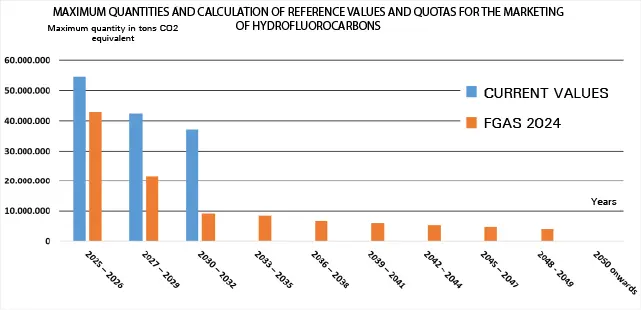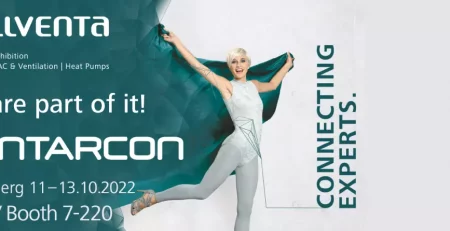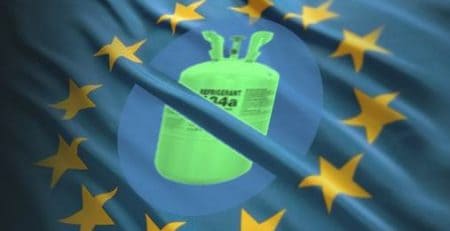FGas 2024, review of Regulation 517/2014
INTARCON2024-03-11T08:38:46+01:00On 20 February 2024, Regulation 2024/573 of the European Parliament and of the Council on fluorinated greenhouse gases (FGas 2024) amending Directive (EU) 2019/1937 and repealing Regulation (EU) No 517/2014 was published.
Main measures in the FGas 2024 regulatory update
The following is an overview of the main measures that have been approved by the European Commission for the update of the F-Gas 2024 regulation. This affects the refrigeration and air-conditioning sector in terms of:
Quota system for hydro-flococarbons (HFCs)
- HFC consumption to be phased out completely by 2050.
- Extension of quota system beyond 2030.
- Maintenance of refrigeration equipment using fluorinated gases with a high global warming potential (2500) is banned from 1 January 2025. Unless the gases are recovered or recycled, in which case they will benefit from a derogation until 2030. A similar ban is introduced for servicing air-conditioning equipment and heat pumps by 2026, with a derogation for recycled gases until 2032.
- Further reduction in the intermediate stages of the HFC quota system.
- Inclusion, from 2025, of HFCs in pharmaceutical metered dose inhalers.
- The baseline against which historical importers of HFCs are allocated quotas is defined according to the quantity imported from 2015 onwards.
- Creation of a quota entitlement system for HFC producers.
- New formal obligations: a company registered in the Fgas Portal can only have one address, an operator can only have one company registered in the Fgas Portal.
- HFC production allowances will be phased down to a minimum of 15% from 2036.
Restrictions on the use and disposal of Fgas
- Ban on the sale of electrical switchgear containing sulphur hexafluoride (SF6). A calendar of prohibitions is established for the sale of this type of equipment with fluorinated gases with a Global Warming Potential (GWP) greater than 1,000 (the SF6 GWP of 24,300) in new installations from 2026 to 2032 depending on the voltage of the equipment. Likewise, from 2035, for maintenance of existing equipment, virgin SF6 cannot be used, and only recycled or regenerated SF6 can be used.
- Avoid as far as possible the emission of these gases in building renovation, refurbishment or demolition works involving the removal of metal-clad panels or foams from laminated boards containing F-gas containing foams. The implementation of this measure should be carried out in line with waste regulations.
- Improve compliance and implementation by providing measures to better control illegal imports of fluorinated gases.
- Inclusion of the F-Gas Portal in the single window environment for European customs.
- Conduct of risk analysis by customs in accordance with Regulation (EU) 952/2013.
- Collaboration between Member States, as well as environmental authorities, customs and market surveillance authorities in the control of illicit trafficking of gases and equipment.
- The maximum amount of administrative penalties shall be 5 times the market value of the illegally imported gases or equipment. It may also be subject to criminal sanctions in line with Directive 2008/99/EC on the protection of the environment through criminal law. Imports of HFCs may not be released unless sufficient quota is available from the importer at the time of release.
Leakage controls
- Thresholds are set for defining the frequency of leakage checks both in kg of refrigerant gas and in tonnes of CO2-eq.
Equipment labelling
- In addition to the 100-year GWP of HFC years, the 20-year GWP of HFCs should be indicated.

Developments that apply to manufacturers of refrigeration, air-conditioning and heat pump equipment following the update of the FGas 2024
For manufacturers of refrigeration equipment, such as INTARCON, air conditioning and heat pumps, new bans for new equipment and appliances will be added to Annex IV. Notably, it establishes a general ban on refrigeration equipment, except chillers, according to which from 2030 no new equipment/installations using F-gases with GWP above 150 may be sold. It also establishes new bans for air conditioners and heat pumps, as well as chillers.
Possibility to modify the quota system for HFCs by increasing the amount for the marketing of heat pumps, if an assessment carried out by the European Commission will show that this quota system would be affecting the heat pump market. All this in order not to compromise the objectives of the EU’s RePower Plan[1].
Furthermore, the update of the FGas 2024 prohibits the export of refrigeration, air conditioning and heat pump equipment with GWP higher than 1000, starting one year after the entry into force of the ban on their placing on the EU market according to the timetable foreseen in Article IV of this proposed Regulation.
How does the revision of the FGas 2024 affect refrigeration and air conditioning installers?
For refrigeration and air conditioning installers, the update of the FGas 2024 means:
New requirements for leakage control, specifically, the obligation to carry out periodic leakage checks for equipment containing unsaturated hydrofluorocarbons (HFOs). Previously, this obligation only existed for equipment containing HFCs, perfluorocarbons (PFCs) or mixtures thereof. Also, as mentioned above, the thresholds that determine the frequency of leakage checks are redefined.
It establishes the obligation for already certified installers to undergo additional training within 5 years after the entry into force of this legislative proposal. In this regard, it should be noted that Spain was a pioneer in introducing the obligation to carry out training in alternative technologies within 4 years after the entry into force of Royal Decree 115/2017.
From 2025, the scope of application of the ban on the use of virgin fluorinated gases with GWP above 2,500 is extended to equipment with a charge of less than 40 tonnes CO2-eq. The use of recycled and reclaimed gases is allowed until 2030.
In addition, from 2032, the use of virgin fluorinated gases with a GWP higher than 750 in refrigeration equipment (except chillers) will not be allowed for servicing existing equipment. The use of recycled and reclaimed gases will be allowed.
Finally, in the case of heat pumps and air conditioning equipment, the use of virgin fluorinated gases with GWP higher than 2,500 in maintenance and servicing operations will be prohibited from 2026. Only the use of recycled and reclaimed gases will be allowed until 2032.





